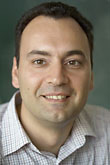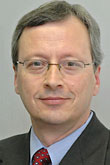Materials scientist George Malliaras named head of Cornell NanoScale Facility
By Bill Steele


George Malliaras, associate professor of materials science and engineering at Cornell, has been named the L.B. Knight Director of the Cornell NanoScale Facility (CNF), starting Aug. 15. Don Tennant, a 1973 Cornell graduate in engineering physics, now at Lucent Technologies, will begin as CNF's director of operations on the same date.
The appointments are the result of more than a year's search in collaboration with researchers who use the national user facility, which is largely supported by the National Science Foundation.
"George and Don will bring new energies and new ideas to CNF, a facility that is already thriving," said Joseph Burns, the I.P. Church Professor of Theoretical and Applied Mechanics and Astronomy and vice provost for physical sciences and engineering at Cornell, in announcing the appointments.
Malliaras succeeds Sandip Tiwari, professor of electrical and computer engineering, who served as director of CNF from 1999 until 2005, when he left to become director of the National Nanotechnology Infrastructure Network, a consortium of 13 nanoscale manufacturing facilities, including CNF. John Silcox, the David E. Burr Professor of Engineering, has served as interim director since then, with senior research associate Jurriaan Gerretsen as associate director.
"I'm honored and delighted," Malliaras said. "CNF has established a dominance in nanoscience and nanotechnology, and the challenge is going to be to perpetuate that excellence. And I look forward in particular to working with Don Tennant. We have a lot to learn from each other."
Malliaras said he plans to expand CNF's efforts to work with biologists and hopes to bring in the medical community. "There are calls from the medical community, especially from surgeons, for better tools, and I think we can help with that." As part of the celebration of CNF's 30th anniversary in 2007, Malliaras plans a series of major symposiums, one of which will deal with nanotechnology in medicine.
Malliaras' research focuses on organic electronics, the use of organic materials in place of such traditional semiconductors as silicon to create electronic devices, including organic light emitting diodes, organic thin film transistors and organic photovoltaics. He received a B.S. in physics from Aristotle University, Greece, in 1991, and a Ph.D. in mathematics and physical sciences from the University of Groningen, the Netherlands, in 1995.
Before joining the Cornell faculty in 1998, he spent two years at the IBM Almaden Research Center. He is the recipient of the National Science Foundation (NSF) Young Investigator Award, the DuPont Young Professor Grant and a Cornell College of Engineering Teaching Award. He is an editor for the Japanese Journal of Applied Physics and serves on the editorial board of Sensors.
Tennant has been a scientist at Lucent Technologies, N.J., and affiliated with Brookhaven National Laboratory on Long Island. He is one of the nation's most highly respected experts in nanofabrication and electron-beam lithography and has held national policy roles.
CNF, which also is supported by Cornell, industry and the New York State Office of Science, Technology and Academic Research, provides facilities for the manufacture and testing of submicroscopic devices for such diverse fields as astronomy, plant pathology, materials science, physics, chemistry and the life sciences. Currently, some 350 Cornell researchers and a similar number of outsiders use the facility.
Media Contact
Get Cornell news delivered right to your inbox.
Subscribe